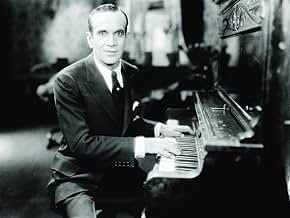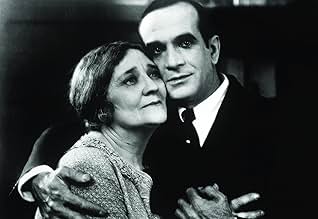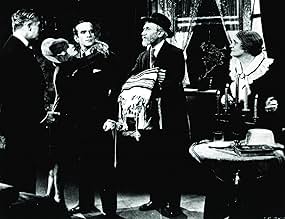Der Sohn eines jüdischen Kantors muss sich den Traditionen seines religiösen Vaters widersetzen, um seinen Traum zu verwirklichen und Jazzsänger zu werden.Der Sohn eines jüdischen Kantors muss sich den Traditionen seines religiösen Vaters widersetzen, um seinen Traum zu verwirklichen und Jazzsänger zu werden.Der Sohn eines jüdischen Kantors muss sich den Traditionen seines religiösen Vaters widersetzen, um seinen Traum zu verwirklichen und Jazzsänger zu werden.
- Für 1 Oscar nominiert
- 3 Gewinne & 1 Nominierung insgesamt
- Jakie Rabinowitz - Age 13
- (as Bobby Gordon)
- Cantor Rosenblatt - Concert Recital
- (as Cantor Joseff Rosenblatt)
- Chorus Girl
- (Nicht genannt)
- Chorus Girl
- (Nicht genannt)
- Small Part
- (Nicht genannt)
- Choreographer - 'April Follies'
- (Nicht genannt)
- Small Part
- (Nicht genannt)
- Violinist
- (Nicht genannt)
- Small Part
- (Nicht genannt)
- Buster Billings
- (Nicht genannt)
- Dance Director
- (Nicht genannt)
Empfohlene Bewertungen
The love interest here is so unusual. He does fall in love with a pretty dancer, but tells her plainly that his career is more important than she is. She later doesn't become part of the choice as would be the case in nearly every other script instead she becomes part of the audience, presenting the dramatic quandary: the stage or God.
The presentation of religion is unique in my experience. Everyone here is a Jew, except the performers. They are the "real" and everyone else is "pretend," performing. Though there are many opportunities to fall into obnoxious stereotypes, its avoided over and over. That's despite the dozens of examples they had before.
In fact, there's an amazing engineering of story here. As any viewer will know, this was the first talkie. It was new, and to emphasize its newness a story was created to emphasize the contrast between old and new.
This film is part silent, part "talkie." It shows a struggle between the old (obviously obsolete) and the vital young. It also depicts in a rather subtle but effective way the "old" god, and the new: there's plenty of talk about the performance hall being a modern church. The music as well: we have the implication that it is not only the setting, the performer and the calling, but the music itself that is something new.
Along the way we get street scenes of the Jewish area of New York. These are genuine street scenes and are absolutely phenomenal: there isn't anything I know that compares. There was an attempt of sorts in "The Pawnbroker," which by itself was strong. But nothing compared to this.
Ted's Evaluation -- 4 of 3: Every cineliterate person should experience this.
This is a powerful story with interesting characters and good songs, to boot. It was different to see Warner Oland as somebody else besides Charlie Chan. He played Jolson's father and I never would have recognized him had I not read the credits. Nor would I have recognized William Demarest.
Jolson, however, is the man who dominates the film. Some of this songs wound up being classics, ones played for years and years, such as "Toot, Toot Toosie" and "Mammy."
Faced with a very tough decision on what to do with his life, Jolson's character does the right thing in the end, which was nice to see. Overall, it's entertaining.
I have great difficulty in understanding the comments listed in the posts of how today's human rights standards can be applied to a film that was created 80 years ago.
We are talking about 1927,and it is hard for me to understand how today's negative comments are made about the Black-face and other racial comments. This was a convention of the time 80 years ago. I do not for a moment agree that the way minorities were treated was correct, but that was 1927, not now! You cannot erase history to make it fit today's standards.
I thought Al Jolson did a superb job in his singing,dialog,and acting in this film for the era. One would need to review and compare the singing and acting styles,that of other performers of the era and make comparisons. Crosby, Sinatra, Eddie Fisher, even Elvis Presley & Jackie Wilson said that Al Jolson was a great influence on their careers. To say he could not sing as in some posts here, is absurd.
But for trying to hold up the Brothers Warner for some extra salary for doing that first sound feature, Georgie Jessel might have been able to repeat the role he created on Broadway as Jakie Rabinowitz aka Jack Robin, cantor's son who runs away from home as a juvenile and comes back home in time to sing Kol Nidre at Yom Kippur services in place of his dying father. Jessel's greed was Al Jolson's gain as America's greatest live entertainer at the time got to inaugurate the era of movie sound.
As Al Jolson was wont to do in his stage shows, he interpolated material from all sources in his first film that he felt was suitable for him. Toot Toot Tootsie and interestingly enough My Mammy were songs he'd done on stage before and were proved material his audience would respond to. The first song he actually does sing is Dirty Hands, Dirty Face which was something he had not done before. Blue Skies which he sings to his mother after returning home as a Broadway star was in fact a current hit on Broadway at the time Jolson was singing it.
People from that era say that you cannot appreciate Jolson on the screen, that to really get the full impact of his dynamic stage presence you had to see him live. Maybe so, but since that isn't possible, there's enough of him in The Jazz Singer and other of his films to realize what a great entertainer he was, black-face or not.
Warner Oland, later to be the first Charlie Chan, plays Cantor Rabinowitz and Eugenie Besserer is touching as Jolson's mother caught hopelessly between her husband and son. In that first scene of a grownup Jolson in a café before he sings Dirty Hands, Dirty Face you will note that is William Demarest who he's dining with. Myrna Loy has a small role as a chorus girl.
Still both the play and the personality dictate that this film is owned exclusively by Al Jolson. Despite later versions with Danny Thomas and Neil Diamond in the lead, the story will always be identified with the man who said we ain't heard nothing yet.
Though The Jazz Singer is exponentially sentimental and mawkish, it does have a very nice depiction of Jewish life and neighborhood in the Teens and Twenties of the last century. And of course The Jazz Singer is a historic first.
Wusstest du schon
- WissenswertesThis is the first feature-length movie with audible dialogue.
- PatzerMary recieves a telegram dated August 8, 1927. Later in the film, Jack is seen writing a letter to Mary, dating it August 7, 1927.
- Zitate
[opening lines, first quote and first words in the first widely-seen talking picture]
Jack Robin: Wait a minute, wait a minute, you ain't heard nothin' yet! Wait a minute, I tell ya! You ain't heard nothin'! You wanna hear "Toot, Toot, Tootsie"? All right, hold on, hold on...
[then he walks back to one of the band members]
Jack Robin: Lou, listen. Play "Toot, Toot, Tootsie", three chorus, you understand. In the third chorus, I whistle. Now give it to 'em hard and heavy, go right ahead.
- VerbindungenEdited into Okay for Sound (1946)
- SoundtracksMy Gal Sal
(1905) (uncredited)
Written by Paul Dresser
Sung by Robert Gordon (dubbed by an unidentified singer)
Top-Auswahl
- How long is The Jazz Singer?Powered by Alexa
- What is 'The Jazz Singer' about?
- Is 'The Jazz Singer' based on a book?
- How does the movie end?
Details
Box Office
- Budget
- 422.000 $ (geschätzt)
- Laufzeit1 Stunde 28 Minuten
- Farbe
- Seitenverhältnis
- 1.33 : 1
Zu dieser Seite beitragen































